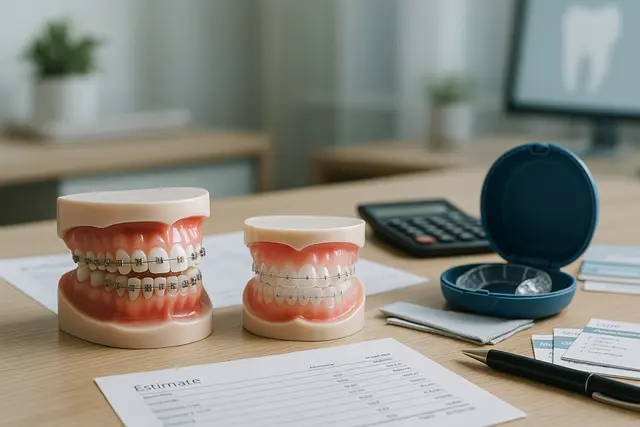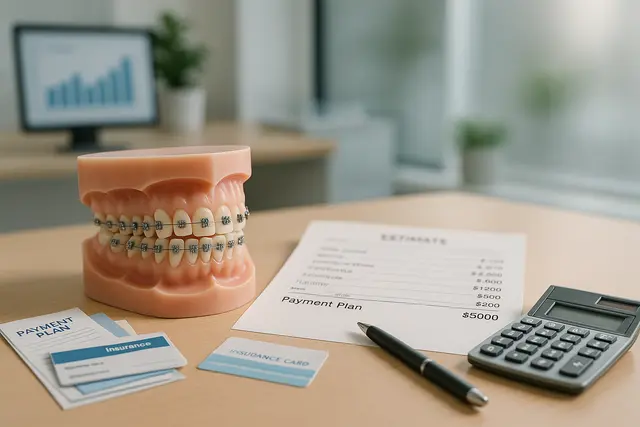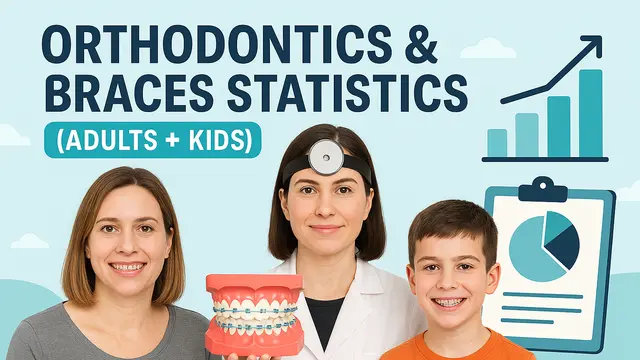Orthodontics
4 min read
Apr 03, 2025
Braces and Sports: How to Protect Your Smile During Physical Activities
Braces are a common part of many young athletes’ lives, but they raise a familiar question: how do you stay active without risking your orthodontic progress, or your teeth? Sports, especially those with physical contact, carry an inherent risk of oral injury. Add brackets and wires into the equation, and the stakes go up.

If you’ve just started your orthodontic journey, you might be wondering: does getting braces mean sitting out your favorite sport? Absolutely not. You can still play sports with braces, and play hard, as long as you take a few smart steps to protect your smile. Trust us, wearing braces doesn’t mean watching the game from the sidelines. It just means being a little more prepared.
Whether you’re diving for a soccer ball, swinging a bat, or sprinting across the finish line, your teeth and braces can stay safe while you give it your all. Let’s talk about how.
Brace Yourself: Why Protection Matters
When you wear braces, your mouth has a little more going on than it used to. Brackets, wires, and all those small pieces work together to move your teeth into place. But because they stick out a bit, there’s also a greater risk of mouth injuries if you get hit in the face while playing a sport.
You don’t want to risk broken brackets, poked gums, or teeth that shift the wrong way. Damage to your braces can be painful, and costly to fix. Plus, it could set your orthodontic treatment back by months. Nobody wants that.
The way to protect your braces while playing sports is simple: wear a mouthguard every time you’re out there. It’s like wearing a seatbelt for your smile.
Play Sports with Braces? You Bet.
Playing a sport with braces is completely doable. In fact, lots of athletes with braces keep up with football, basketball, soccer, and everything in between. The key is minimizing the risk of oral injuries by gearing up properly before every game and practice.
An orthodontic mouthguard is your MVP here. It’s different from a regular mouthguard you grab off the shelf. A mouthguard made for braces leaves extra space for your brackets and wires so they don’t get smashed into your gums or teeth. Plus, it cushions your mouth during impacts, helping you avoid major injuries.
You can find over-the-counter orthodontic mouthguards, but if you’re serious about staying protected (and comfortable), ask your orthodontist about getting a customized orthodontic mouthguard. It’s built to fit your unique smile, and your braces, perfectly.
And if you think you’re safe because you’re playing a “non-contact sport” like track or swimming, think again. Falls, stray elbows, and even accidental collisions happen all the time, even when you're not expecting it. Better safe than sorry.
Sports While Wearing Braces: Here's the Playbook
Worried that braces will affect how you play sports? Honestly, they won’t, unless you forget to protect your mouth.
When you’re participating in sports, whether it’s high-contact sports like football or something more chill, there’s always a risk of impact. A ball to the face, a fall, or a flying elbow can cause real damage, not just to your braces, but to your teeth and gums too.
Wearing a properly fitted orthodontic mouthguard can seriously minimize the risk of injury. Think of it like having the best goalie in the world protecting your smile. Without one, the risk of damage to your braces skyrockets. And the risk of oral injuries like cut gums, chipped teeth, or worse, is way higher too.
There are different types of mouthguards, and finding the right mouthguard is important. Stock mouthguards are cheap but don’t fit well, boil-and-bite mouthguards are a little better, but customized orthodontic mouthguards are where it’s at if you want true protection. They’ll stay put, feel comfortable, and make it easier to breathe and talk while you play.
Whether you're dribbling down the court, vaulting over hurdles, or scoring goals, a mouthguard provides the cushion your mouth needs to stay in one piece.
Metal Braces? No Problem.
If you’ve got metal braces, you might wonder if you’re at more risk. Truthfully, traditional braces are tough, but they’re not indestructible. Playing sports with metal braces just means you’ve got to be extra smart about protecting your teeth and braces.
An orthodontic mouth guard shields your brackets and wires from the worst hits. It also protects your gums from getting torn up if you accidentally get knocked in the face. Trust us, a bloody mouth and broken braces are not the kind of battle scars you want after a game.
If you're worried about how to protect your braces while playing, talk to your orthodontic specialists. They can help you find the best orthodontic appliances to keep everything safe and moving along the right way.
Remember, wearing braces doesn’t mean avoiding the things you love, it just means adding a little extra protection into your routine. That’s a small price to pay for a healthy, beautiful smile.
Final Whistle: Play Smart, Smile Bright
Sports and braces go together just fine, as long as you take a few smart precautions. You can still play sports with your new braces, tackle your favorite activities, and stay in the game without putting your smile on the line.
The way to protect your braces while playing is simple: wear a mouthguard every time. It’s the best insurance you can give your teeth, your gums, and your orthodontic appliances.
Getting braces is the start of something exciting. Protect your mouth, play hard, and keep showing off that bright future smile every time you step onto the field.
Can You Still Play Sports With Braces?
Yes, you can absolutely play sports with braces. Many athletes wear braces without issue by taking the right precautions, mainly wearing a mouthguard during all practices and games. This protects your teeth, brackets, and gums from injury if there’s an unexpected hit or fall.
Why Is a Mouthguard So Important With Braces?
Braces add extra surfaces that can injure your mouth if struck. A properly fitted orthodontic mouthguard cushions your braces and soft tissues, preventing cuts, broken brackets, or shifting teeth. It’s a simple way to avoid pain, damage, and delays in your treatment.
What Kind of Mouthguard Should You Use With Braces?
The best option is an orthodontic mouthguard, which is specially made to fit over braces. While store-bought boil-and-bite guards offer some protection, a custom orthodontic mouthguard made by your orthodontist provides the most secure, comfortable fit, especially during high-contact sports.
Are Metal Braces Safe for Sports?
Yes, metal braces are safe for sports as long as you use a mouthguard. Metal brackets are durable but not immune to damage. A strong impact without protection can lead to broken wires, lip injuries, or delays in your treatment, so wearing a mouthguard is essential.
Read Next
Related Posts

Orthodontics
Retainer That Looks like Braces: Benefits for Long-Term Alignment
A retainer might not get as much attention as braces, but it plays a crucial role in maintaining your smile after orthodontic treatment. Whether you're new to retainers or curious about the type that looks like braces, understanding their purpose and benefits is key to keeping your teeth aligned for the long haul.
6 min read
Sep 15, 2025

Orthodontics
How Much Are Metal Braces? Cost Comparison With Other Options
Thinking about getting braces but overwhelmed by the cost? You’re not alone. Orthodontic treatment can be a major investment, and understanding the different price points, from metal braces to clear aligners, can help you make a smart, confident decision.
5 min read
Sep 15, 2025

Orthodontics
Orthodontics & Braces Statistics (Adults + Kids)
Orthodontics has transformed from a niche medical service for teenagers into a booming sector that spans all ages. Today, both adults and children seek orthodontic treatment to improve their smiles, fix bite issues, and boost self-confidence.
4 min read
Aug 21, 2025
Don’t have time to research every dentist around you?
See why 30k+ patients trusted us